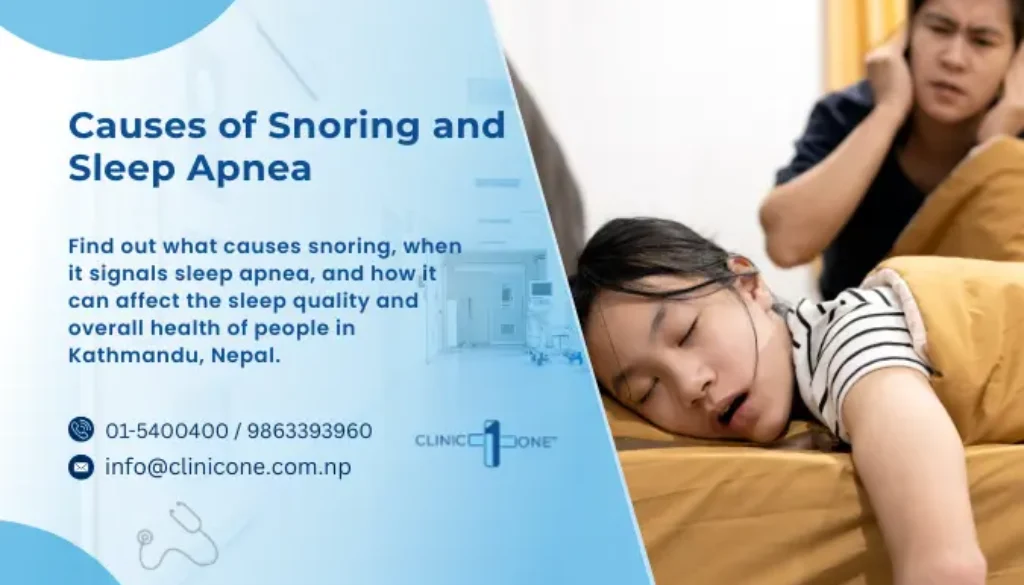Causes of Snoring and Sleep Apnea: Health Risks You Can’t Ignore

Snoring, which means “घुर्ने” in Nepali, usually starts as a joke: a husband’s loud snoring keeps his wife awake, or a family teases someone for their “tractor-like” sound at night. But snoring isn’t just a funny bedtime story. It’s a signal that your body might be struggling to breathe properly during sleep.
In Nepal, many people experience snoring without realising it could point to deeper health concerns like poor sleep quality, nasal blockage, or even sleep apnea. Over time, what seems harmless can quietly affect your energy, mood, and even your heart health.
How Does Snoring Happen?
Snoring happens when air doesn’t move smoothly through your nose and throat while you sleep. This makes the tissues in your airway vibrate, creating that familiar sound. Sometimes, it’s soft and occasional. Other times, it’s loud enough to shake the whole room.
It can be because of:
- Nasal congestion or allergies: A blocked nose makes you breathe through your mouth, increasing vibration.
- Sleeping position: Lying on your back can make your tongue fall backward, narrowing the airway.
- Obesity or being overweight: Extra tissue around the neck can press on the throat during sleep.
- Alcohol, smoking, or certain medications: These relax the muscles and make the airway collapse more easily.
- Aging: Muscles in the throat naturally relax with age, making snoring more common.
That said, if your snoring is getting louder or more regular, it may be time to look beyond these surface causes and explore what’s really going on inside your airways.
Tired of losing sleep because of your snoring or your partner’s?
Clinic One’s ENT and sleep specialists can identify the cause and guide you to proper care.
Hidden Causes Behind Persistent Snoring
Persistent snoring often comes from issues deeper than just sleeping position or tiredness. The most common causes include a deviated nasal septum, enlarged tonsils, sleep apnea, chronic nasal congestion, and weakened throat muscles. These conditions narrow the airway, forcing air to vibrate more as it passes through.
- Deviated Nasal Septum: When the thin wall between your nostrils bends to one side, airflow becomes uneven. This makes breathing harder during sleep and leads to loud, repetitive snoring sounds.
- Enlarged Tonsils or Adenoids: Swollen tonsils narrow the throat, especially in adults who have had frequent throat infections. The smaller the passage, the louder the vibration when air moves through.
- Sleep Apnea: This condition causes short pauses in breathing throughout the night. Each pause strains the body and reduces oxygen levels, often making snoring heavier and more intense.
- Chronic Nasal Congestion: Dust, pollution, and allergies often block nasal passages. Continuous mouth breathing due to a blocked nose increases snoring and dry throat symptoms. Air pollution in Kathmandu is high, so people across the valley are especially vulnerable to these effects.
- Weak Throat Muscles: When throat or tongue muscles relax too much during sleep, they partially block the airway. The airflow becomes turbulent, producing deep snoring that often disturbs both the sleeper and their partner.
Why Is Snoring Dangerous?
Snoring is dangerous because ignoring it for too long can turn a small inconvenience into a serious medical concern. It can reduce oxygen intake, disturb deep sleep cycles, and increase the risk of long-term health problems.
- Poor Sleep Quality: Snoring interrupts your natural sleep rhythm, leaving you tired, irritable, and unable to focus during the day, even after what feels like a full night’s rest.
- High Blood Pressure and Heart Strain: Repeated drops in oxygen during sleep trigger stress hormones, forcing your heart to work harder. Over time, this increases the risk of hypertension, arrhythmia, and even heart disease.
- Morning Headaches and Dry Mouth: Reduced airflow can cause low oxygen levels and mouth breathing, leading to headaches, sore throat, and dehydration every morning.
- Relationship Strain: Constant snoring disturbs your partner’s sleep, too. Many couples in Nepal joke about “separate beds,” but in reality, it affects emotional closeness and intimacy.
- Sleep Apnea Risk: Habitual snoring can be an early sign of obstructive sleep apnea, where breathing repeatedly stops and starts. Left untreated, it can increase the risk of stroke, diabetes, and heart failure.
Snoring and Sleep Apnea
Not all snoring is the same. While occasional snoring is common and usually harmless, sleep apnea is a serious condition where breathing stops repeatedly during sleep. These pauses reduce oxygen levels and disrupt sleep, leading to long-term health risks.
What Is Sleep Apnea?
Sleep apnea occurs when the airway partially or completely collapses during sleep. Each pause in breathing can last a few seconds to minutes and may repeat dozens of times per night. People with sleep apnea often snore loudly and wake up feeling unrefreshed, even after a full night’s sleep.
Snoring and sleep apnea often go together. Loud, frequent snoring is one of the most common warning signs of sleep apnea, though not everyone who snores has the condition. Paying attention to patterns like pauses in breathing, daytime fatigue, or waking up gasping helps distinguish simple snoring from a serious disorder.
For instance, our sleep apnea quiz for children can help parents recognise whether their child’s snoring might be a sign of something more serious. Many adults and children experience sleep apnea without realising it, often mistaking it for normal snoring. Identifying these warning signs early allows doctors to assess the condition and recommend appropriate treatment.
Here’s a comparison between normal snoring and sleep apnea:
| Feature | Normal Snoring | Sleep Apnea |
|---|---|---|
| Sound | Soft to moderately loud | Loud, irregular, often with choking or gasping |
| Breathing | Continuous airflow | Pauses or stops repeatedly |
| Frequency | Occasionally, it may happen in certain positions | Every night or most nights |
| Daytime Effects | Usually minimal tiredness | Excessive sleepiness, difficulty concentrating, irritability |
| Health Risks | Low, but you should monitor it | High risk of hypertension, heart disease, stroke, and diabetes |
| Treatment Urgency | Generally not urgent, though we advised finding its root cause | Requires prompt evaluation by an ENT or sleep specialist |
When to Seek Medical Help
Not all snoring requires medical attention, but certain signs indicate that evaluation by an ENT or sleep specialist is necessary if you find:
- pauses in breathing during sleep, noticeable choking or gasping episodes.
- excessive daytime sleepiness and feeling unusually tired despite a full night’s sleep.
- loud, persistent snoring every night.
- morning headaches, dry mouth, or any signs of disrupted sleep and low oxygen levels.
- heart-related symptoms such as irregular heartbeat, high blood pressure, or other cardiovascular issues.
If you are experiencing any of the signs mentioned above, immediately consult with a doctor
In Kathmandu, Clinic One has all the experts you need. Our ENT department and sleep specialists (pulmonologists) will examine snoring using detailed physical checks, nasal and throat assessments, and, if needed, sleep studies. We identify conditions such as sleep apnea, nasal obstruction, or obesity-related snoring and recommend the appropriate treatment based on the findings.
Key Takeaways
- Snoring happens when airflow through the nose and throat is partially blocked.
- Common hidden causes include deviated septum, enlarged tonsils, chronic nasal congestion, weak throat muscles, and sleep apnea.
- Sleep apnea is a serious condition where breathing stops repeatedly during sleep and often occurs alongside loud, frequent snoring.
- Persistent snoring can lead to poor sleep quality, daytime fatigue, and increased risk of heart problems.
- Medical evaluation by ENT or sleep specialists is necessary when snoring is loud, frequent, or accompanied by pauses in breathing.
Frequently Asked Questions
How to stop a person from snoring?
Encourage them to sleep on their side, maintain a healthy weight, and keep nasal passages clear. If snoring continues, an ENT or sleep specialist should assess for sleep apnea or nasal blockage.
What is the best treatment for snoring?
The best treatment for snoring depends on the cause. It may include nasal sprays, lifestyle changes, dental devices, or minor surgical procedures. A proper evaluation helps find the most effective approach.
Is snoring good or bad?
Occasional snoring is harmless, but frequent or loud snoring may signal sleep apnea or other airway problems that affect sleep and heart health. It’s best not to ignore persistent or continuous snoring.
How to deal with a partner who snores?
Use earplugs, sleep in a slightly elevated position, and encourage your partner to get checked. Persistent snoring can strain relationships, so a medical evaluation often helps both partners rest better.
How to stop snoring while sleeping?
Avoid alcohol before bed, manage allergies, and maintain a regular sleep schedule. If snoring continues despite these changes, a sleep study can identify deeper issues like obstructed airways.


